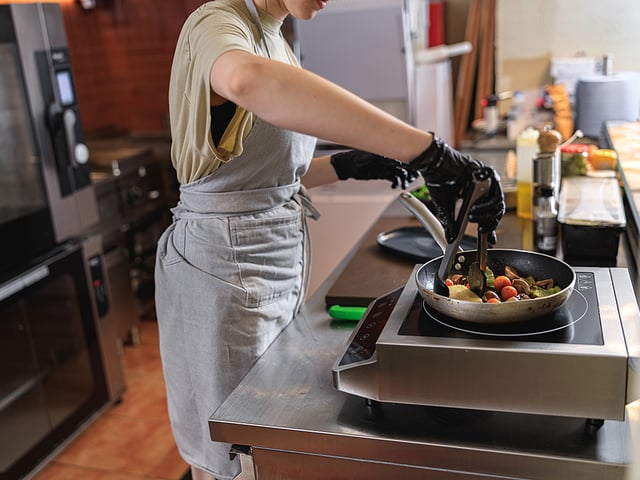
How Many Times Can I Fail the ServSafe Exam?
The ServSafe exam is a nationally recognized food safety certification program that aims to ensure the safety of food by educating food service workers and managers on food safety principles. Many food service establishments require their employees to hold a ServSafe certification to ensure that they operate at the highest level of food safety. The National Restaurant Association administers the exam, which covers topics such as foodborne illnesses, personal hygiene, cross-contamination, and sanitation.
But what happens if you fail the ServSafe exam? How many times can you retake it? And what can you do to increase your chances of passing? Read on to find out more.
What is on the ServSafe Exam?
There are six ServSafe exams: ServSafe Manager, ServSafe Food Handler, ServSafe Alcohol Primary, ServSafe Alcohol Advanced, ServSafe Allergens, and ServSafe Workplace. The exam(s) you will need to take depends on your role and where you live, though at minimum most people will take either the ServSafe Manager or the ServSafe Food Handler exams. Key areas covered on these exams include:
-
Foodborne Illnesses: It is crucial to understand common foodborne illnesses, how they are caused, and how to prevent them. The six most common foodborne illnesses are Norovirus, E. coli, Listeria, Salmonella, Clostridium perfringens, and Campylobacter.
-
Hazard Analysis and Critical Control Points (HACCP): Physical, chemical, and biological contaminants threaten food safety. To do well on the ServSafe exam, you should understand the principles of HACCP and how to implement a HACCP plan in a food service setting.
-
Personal Hygiene: Personal hygiene is always important, especially if you work in food service. You should understand the importance of personal hygiene for preventing the spread of foodborne illnesses, with emphasis on how hand washing and proper attire can affect food safety.
-
Cross-Contamination: Cross-contamination is said to have occurred when bacteria is accidentally transferred from one object to another. Those working in the food service industry should understand how to prevent cross-contamination in a food service setting, including proper food storage and handling.
-
Time and Temperature Control: Understanding how to properly store, cook, and hold food at the correct temperatures to prevent foodborne illnesses is a critical skill of the food handler.
-
Cleaning and Sanitizing: Understanding the importance of proper cleaning and sanitizing to prevent the spread of foodborne illnesses is essential for anyone that works with or around food.
-
Pest Control: While bugs and rodents may not immediately come to mind when you think of food safety, understanding how to prevent and control pests in a food service setting is critical. Infestations can lead to food contamination and building damage; extreme cases have led to restaurants closing their doors.
How Many Times Can You Retake the ServSafe Exam?
If you fail the ServSafe, don’t worry, you are not alone. The good news is that you can retake the exam if you didn’t get a passing score initially. If you fail the exam once, you can retake it within 30 days. If you fail twice in a row, you must wait 60 days before rescheduling your third attempt. Only four attempts are allowed in a year, so if you fail four times, you must wait a significant amount of time before your fifth attempt. When you a ready to retake the exam, you should reach out to your ServSafe proctor or the organization that first administered your exam. Keep in mind that every exam attempt will have a fee that varies by specific test and state.
Tips for Passing the ServSafe Exam
Passing the ServSafe exam requires a solid understanding of food safety principles and a good study strategy. Here are some tips to help you pass the exam:
-
Take a ServSafe Course: To prepare for the exam, consider taking a ServSafe course. This course will cover all the topics on the exam and provide you with a solid understanding of food safety principles.
-
Study the ServSafe Study Guide: ServSafe study guides are a comprehensive resource that cover all the topics on the exam. Make sure to read and understand each section thoroughly.
-
Take Practice Exams: Take as many ServSafe practice exams as possible to get a sense of the types of questions on the exam. Practice exams will also help you to identify areas where you may need to study more and help build your confidence for test day.
-
Memorize Key Terms and Definitions: FIFO? FAT TOM? The ServSafe exam includes many technical terms, acronyms, and definitions you will need to know. Remember to memorize these key terms and definitions to increase your chances of passing.
-
Get a Good Night’s Sleep: Make sure to get a good night’s sleep before the exam. Being well-rested will help you to stay focused and alert so you can do your best.
Get Ready to Pass your ServSafe
Passing the ServSafe exam is crucial in becoming a food service professional. While the exam can be challenging, with proper preparation and studying, you can pass the exam. Remember, there is no limit to the number of times you can take the ServSafe exam, but you must follow the waiting period and pay the exam fee each time you retake the exam.
Keep Reading

ServSafe Food and Alcohol Safety Exams Blog
How Long Does ServSafe Certification Last?
The ServSafe certification is a critical credential for professionals i…

ServSafe Food and Alcohol Safety Exams Blog
The Big Eight Food Allergens are Now the Big Nine
An allergen is typically a harmless protein that, for some, the immune …

ServSafe Food and Alcohol Safety Exams Blog
ServSafe Food Handler vs. ServSafe Manager: Which Course is Right for You?
The food service industry requires stringent adherence to safety and hy…